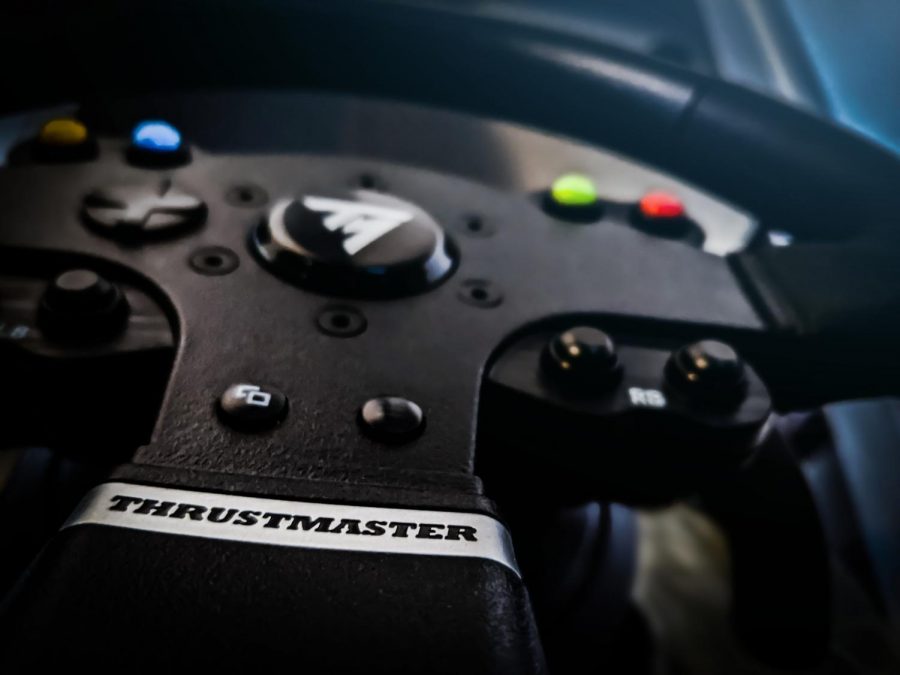Drivers, Start your simulators!: With Coronavirus in full swing, the world of auto racing seeks solace in an ostracized hero: sim racing.
To truly experience simracing, racers can use specialized controllers called racing wheels. Wheels such as Thrustmaster’s TMX Pro (see picture) offer drivers the most realistic experience possible in today’s market.
April 8, 2020
Automotive Simulator Racing (Sim racing) is a virtual form of motorsports where drivers use video games called ‘simulators’ as a substitute to real-life racing. A booming, yet niche, genre thanks to the COVID-19 (Coronavirus) outbreak, sim racing is getting its chance at the spotlight.
Anyone can get into sim racing by owning any sort of video-gaming device. Designed to combat the rising costs of motorsports, from Xboxes to computers, there are numerous iterations devoted to the same objective: providing the most realistic driving experience possible.
However, realism comes at a price. As veteran sim racer and Oakdale Junior Julian Brooks states, “Although sim racing is much cheaper than actual motorsports, it still is expensive… which not everyone can afford.”
To get the most immersive, high-tech equipment available, one could spend a small fortune; an amount, Brooks conveys, would be better off spent to “buy a car to explore the automotive world with.”
So why is a largely unheard of set of video-games suddenly a big deal? Coronavirus. Simracing in 2020 is at its best ever. With breakthrough technologies such as laser scanning, dynamic (actively changing) track surfaces, and real time day/night transitions simulations rival the real thing. This, with the ability to manipulate race distances and factors, such as tire wear or fuel depletion, give race organizers the opportunity to curate captivating spectacles.
With the Coronavirus destroying opportunities for real life auto races this spring, racing fans worldwide face an unprecedented drought, where no events will run from any major series until further notice. Stranding viewers from their passion, this lapse in action leaves the door wide open for its virtual alternative. With numerous upgrades to gameplay and advances in spectator interaction, sim racing not only talks the part, but looks it; and the timing couldn’t be better.
Video Game is its basis, sim racing comes with a litany of potential problems. Volatile as they are, games and participants are prone to problems not seen in real life, such as disconnections, lag, or freak accidents. As accomplished sim racer Dean Thompson explains, “You do have to be careful though with things such as disconnections, as that will be a big turnoff to viewers.”
According to Thompson, “People won’t tune in if the racing isn’t good,” and with no prospect of bodily harm in sim racing, it in itself sets a precedent that’s dangerous going forward.
As seen in top level competitions such as Gran Turismo’s World Tour, behaviors one would think twice about in real life, can be performed in game without a second thought. Although this adds drama to the racing, it also offers the potential to ruin it for both the drivers and the audience.
Thanks to Coronavirus putting the racing season on hold, viewership of sim racing’s backbone, league racing (where drivers race at a designated time each week) is at an all time high. Sim racing events, one-offs, channels, and drivers are seeing increases in subscriptions, donations, and social media presence during this age of ‘social distancing’ as well,but that’s only the beginning. As Brooks conveys, “a big focus in motorsports is [the] marketing and imagery of a company that sponsors a racing team or a car manufacturer.”
If sim racing can solidify itself and build its brand during the world’s stay-at-home phase, the underrepresented niche may ensure its notoriety. If its rise continues in coming weeks, the COVID-19 pandemic may just end up being sim racing’s outbreak.





























